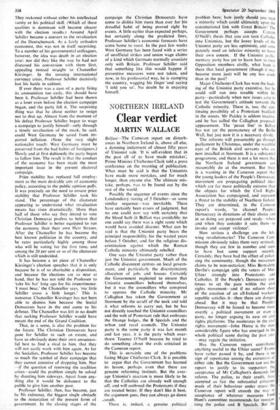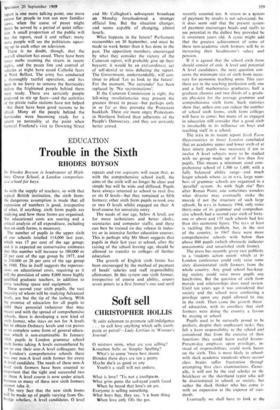NORTHERN IRELAND
Clear verdict
MARTIN WALLACE
Belfast—The Cameron report on disturb- ances in Northern Ireland is, above all else, a damning indictment of almost fifty years of Unionist rule. 'It is self-evident that in the past all of us have made mistakes', Prime Minister Chichester-Clark told a press conference on the morning of publication. What must be said is that the Unionists have made more mistakes, and for much longer, than anyone else. The ultimate mis- take, perhaps, was to be found out by the rest of the world.
Possibly the sequence of events since the Londonderry rioting of 5 October—or some similar sequence—was inevitable. There have certainly been errors of judgment, but no one could now say with certainty that the blood bath in Belfast was avoidable; no one could say there was a right route which would have avoided disaster. What can be said is that the Unionist party bears the principal responsibility for the wasted years before 5 October, and for the religious dis- crimination against which the Roman Catholic minority ultimately rebelled.
One says the Unionist party rather than just the Unionist government. Much of the Catholic discontent centres on local govern- ment, and particularly the discriminatory allocation of jobs and houses. Certainly the Government neglected to ensure that Unionist councillors behaved themselves, but it was the councillors who conspired to oppress the Catholic minority. Mr Callaghan has taken the Government at Stormont by the scruff of the neck and told it what reforms to carry- out, but he has not directly touched the Unionist councillors and the web of Protestant rule that embraces the Orange lodges, the B Specials and the urban and rural councils. The Unionist party is the same party it was last month and last year, it is the party which over- threw Terence O'Neill because he tried to do something about the evils criticised in the Cameron report.
This is certainly one of .the problems facing Major Chichester-Clark. It is possible to argue that the Government has learned its lesson, perhaps even that there are genuine reforming instincts. But the aver- age Unionist's reaction is more likely to be that the Catholics are already well enough off, and will outbreed the Protestants if they are treated better. If they don't like it here, the argument goes, they can always go down .south.
There is, indeed, a genuine political
problem here; how,justly should you treat a minority which could ultimately upset the constitutional link with Great Britain? The Government perhaps accepts Captain O'Neill's thesis that you can turn Catholics into Unionists, but the lower levels of the Unionist party are less optimistic, and some patently need an inferior-minority to boost their own esteem. If the Unionist parlia- mentary party has yet to learn how to treat Opposition members civilly, what hope is there that local government (though it may become more just) will be any less crude than in the past?
Major Chichester-Clark has won the back- ing of the Unionist party executive, but he could still run into trouble within his _party—particularly when new issues arise to test the Government's attitude towards the Catholic minority. There is, too, the con- tinuing possibility of a Protestant backlash in the streets. Mr Paisley is seldom inactive. and he has called the Callaghan proposals appeasement. The 'peace line' in Belfast has not yet the permanency of the Berlin Wall, but just now it is a necessary divide.
The reforms will presumably go through parliament by Christmas, under the watchful eyes of the British civil servants who are now installed at Stormont. It is a substantial programme, and there is not a lot more that the Northern Ireland government can reasonably do at the moment. But there is a warning in the Cameron report th.,t the young leaders of the People's Democrats movement are propagating political idea' which are far more politically extreme than the objects for which the Civil Rights Association has campaigned, and represent a threat to the stability of Northern Ireland. They are determined, in the Cameron report's words, 'to channel People's Democracy in directions of their choice and in so doing are prepared and ready—where and when they consider it suits them—to invoke and accept violence'.
How serious a challenge are the left- wing revolutionaries? The Cameron Com- mission obviously takes them very seriously, though they -are few in number and seem to have lost some support recently. Certainly, they have had the effect of polari- sing the community, though the movement claims to be non-sectarian; Miss Bernadette Devlin's campaign split the voters of Mid- Ulster strongly into Protestants and Catholics. If the People's Democracy con- tinues to set the pace within the civil rights movement—and if no reform short of the creation of an all-Ireland workers' republic satisfies it—then there are dangers ahead. But it may be that People'• Democracy will be forced to become more overtly a political movement or even party, no longer arguing its case on civil rights platforms. The moderates in the civil rights movement—John Hume is the most considerable figure who has emerged in the whole political scene during the past year —may regain the initiative. Has the Cameron report contributed anything useful to the Ulster scene? Events have rather passed it by, and there is no sign of repentance among the extremists of either side. But the Government can use the report to justify to its supporters the acceptance of Mr Callaghan's demands for reform. The police, to their credit, have accepted as fair the substantial criticisms made of their behaviour under stress; the Cameron report will smooth the way to acceptance of whatever measures Lord Hunt's committee recommends for reorgan- ising the police and B Specials. But the report is one more talking point, one more excuse for people to trot out now familiar views, when the cause of peace might better be served by a period of quiet reflec- tion. A small proportion of the public will buy the report, read it and reflect; many more people will see the politicians squar- ing up to each other on television.
There is no doubt, though, that the overall situation has eased. There have been fewer mobs roaming the streets in recent nights, and the peace line and control of vehicles at night have eased Catholic fears in West Belfast. The army has conducted a thoroughly tactful operation, and has been in no hurry to remove the barricades before the frightened people behind them were ready. There are certainly people prepared to stir up fears—and the activities of the pirate radio stations have not helped —but there have been good. reasons to be afraid. Many of the people behind the barricades were becoming ready for a return to normality at the point when General Freeland's visit to Downing Street and Mr Callaghan's subsequent broadcast on Monday foreshadowed a stronger official line. But the situation changes, and seems capable of changing, almost hourly.
What happens in the future? Parliament reassembles on 30 September, and must be made to work better than it has done in the past. The opposition members, encouraged by what they consider the victory of the Cameron report, will probably give up their boycott; it would be an extraordinary act of self-denial to miss debating the report. The Government, understandably, will con- tinue to plead 'Let us look to the future'. For the moment, 'No surrender' has been replaced by 'No recriminations'.
If the Cameron Commission is right, the left-wing revolutionaries may present the greatest threat to peace—but perhaps only in so far as they provoke the Protestant backlash. There are more angry Protestants in Northern Ireland than adherents of the People's Democracy, and they are certainly better armed.









































 Previous page
Previous page